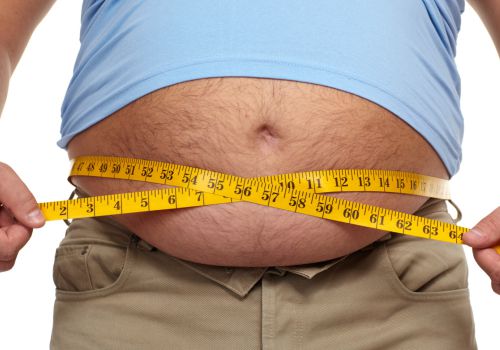Obesity affects men and women. But for men it can hit at the heart of their masculinity, since obesity takes a special toll on male hormones, sexuality, and prostate health… In a nutshell, obesity makes men less ‘manly’.
It’s no secret that obesity is bad for health, negatively affecting cholesterol levels, blood sugar and insulin levels. It increases the risk of heart attack, stroke, hypertension, diabetes, gallstones, cancer, osteoarthritis, obstructive sleep apnea, fatty liver, and depression. All in all, obesity is a killer; in fact, obesity and lack of exercise are responsible for 1,000s of deaths each day, and if present trends continue, they will soon overtake smoking as the leading preventable cause of death in many parts of the modern world.
But for men, obesity also affects the very hormone that makes them ‘manly’.
Testosterone is the major male hormone. It is responsible for the deep voice, large muscles, and strong bones in males, for development of the male reproductive organs, for sperm production and libido, and for the typical male pattern of beard growth.
So how does obesity specifically impact manhood? :
- Lower testosterone levels:
Each one-point increase in BMI is associated with a 2% decrease in testosterone. Waist circumference is an even stronger predictor of low testosterone levels than BMI. A four-inch increase in waist size increased a man’s odds of having a low testosterone level by 75%; for comparison, 10 years of aging increased the odds by only 36%. All in all, waist circumference was the strongest single predictor of developing symptoms of testosterone deficiency.
- Erectile dysfunction:
Although men with erectile dysfunction (ED) often blame testosterone, hormonal disorders account for only 3% of ED. But even with normal testosterone levels, men who are obese have an increased risk of ED. Studies found that weight loss can indeed improve things for overweight men with ED. Men who lost the most weight enjoyed the greatest benefit.
- Fertility, Reproductive function:
Obesity takes a toll on sexuality, and it may also impair fertility. American research has linked obesity to low sperm counts and reduced sperm motility.
- Kidney stones:
Stones strike men twice as often as women, and obesity increases a man’s risk.
- Benign prostatic hyperplasia:
Benign prostatic hyperplasia (BPH) becomes more common as men get older. It also becomes more common as men gain girth. In essence, bigger bellies means bigger prostate.
- PSA levels and cancer detection:
Prostate-specific antigen (PSA) levels rise as the prostate gland enlarges, and although obesity appears to grow the prostate, it lowers PSA levels (due to increased blood volume).
Because obesity lowers PSA levels, it can make it harder for doctors to use PSA measurements to detect prostate cancer in overweight men.
- Prostate Cancer:
Extra body fat increases a man’s risk of developing prostate cancer, being overweight increases a man’s risk by 8%, being obese boosts risk by 20%, and being severely obese increases risk by 34%. And that’s not all. Obesity increases the odds that prostate cancer will spread beyond the gland, and it also makes relapse after treatment more likely. In addition, obesity boosts a man’s chance of developing urinary incontinence after a radical prostatectomy operation.
- Other Cancers:
Obesity increases the body’s production of growth factors such as insulin and insulin-like growth factor 1 (IGF-1). Both increase the rate of cell multiplication, and high blood levels of IGF-1 have been linked to an increased risk of prostate cancer, colon cancer, and other malignancies.
It’s hard to shed excess weight, but it is possible with the correct TLC-Program. It’s the manly thing to do, and the time to start is now. Book a FREE ASSESSMENT here: https://tlcforwellbeing.com/contact-us/

